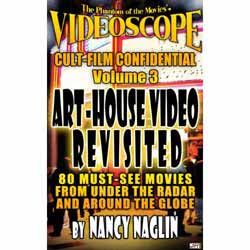|
Click here to return to the main site. Book Review
At the urging of Cultmachine and yours truly, PhanMedia’s Nancy Naglin plunges into her Videoscope archives once more to gather the best of her best. It’s cineastes like Naglin, who remind people like me, that there is a world of film beyond Hollywood and New York. UK and European fans already know this and it is this world wise cinematic tapestry Naglin weaves for us. Movies from every continent except Antarctica, titles unheard of because they were never marketed within thousands of miles of our screens or when they were, recognized only faintly and in passing. Naglin is a filmic universalist as her caches show: Global Screen Scan, Classics, Lit Hits, Mondo Bio and Video Verité. In this age of shuttering bijous, physical entertainment is the unassailable bunker for the film lover and collector. Yes, there are streaming sources but they can be fitful or dry up completely according to the mercurial mandarins of the internet and the samurai strategies bound by finite bandwidth. Suppliers sometimes map online selections with the disappointment of a prairie river: a mile wide but an inch deep. Global Screen Scans introduces us to The Assassins (2012 Well Go USA) directed by Linshan Zhao and stars Chow Yun-Fat. It is a “bristling overloaded Chinese-made epic, set in the turbulent and often romanticized Three Kingdom Period (circa 280 C.E), sends the blade along multiple and interconnecting paths.” Principals are “carted off to a brutal martial arts training camp where they’re raised to be assassins.” Assembled in court there are “converging betrayals, unmaskings and of course, splendidly enacted deaths… the necessary flying, catapulting, flung netting—that would be standard… but the deaths here, including one quartering, are cagey and superb…” What can I say? Naglin knows I want to see this movie, even if I don’t understand the historical nuance. Attack on Leningrad (2009 E One Entertainment) directed by Alexander Buravsky, starring Mia Sorvino, Gabriel Byrne, Armin Mueller-Stahl and Olga Sutulova balances the accounts of D-Day and Eisenhower with the truly massive battle of World War II where 1.5 million civilians died. Of course a heroic story about those Russians and a few transplanted westerners isn’t going to get much push in the caped crusader spandex market, nonetheless it’s an epic to know about. City of Ghosts (2002 MGM Entertainment) directed by Matt Dillon, starring Dillon, James Caan, Natascha McElhone, Gerard Depardieu, Stellan Skarsgard all in Cambodia with Russian Mafiosi and Caan reminding us what a top-notch asshole he can be. We all need to see this movie. Then there’s Death and the Maiden (1994 New Line) with Sigourney Weaver and Ben Kingsley which has acquired bad odour through the decades because it’s a Roman Polanski film about revenge, which Naglin reminds us, is a subject he knows something about. Are we to be deprived of this “taut, tantalizing and enraging” experience because of the fallout of Weinstein, Epstein and… Polanski? You the home viewer get to decide that one. I’d see it again. And on to Double Happiness (1995 New Line) directed by Mina Shum starring Sandra Oh about Canadian-Chinese offspring dealing with the stress between generations with typecasting and double lives thrown in. “How to be Chinese and North American when you’re not either... Everyone, to save face and protect loved ones, keeps a secret.” Down in the Valley (2005 ThinkFilm) a “cowboy Taxi Driver” with Edward Norton, Evan Rachel Wood, David Morse, Rory Culkin, Geoffrey Lewis brings to Naglin’s mind, River’s Edge. Cryptically, she adds, “and Bruce Dern as an irascible horse owner.” I’m guessing this is one of those movies Ed Norton is so unpopular for which is reason enough to hunt it down and see it. The Emperor’s Shadow (1996 Fox Lorber) “troubled eroticism and the perils of dynasty building”; Exotica (1995); Happy Together (1997) a Wong Kar-Wai masterpiece; and onward to My Son the Fanatic (1998) directed by Udayan Prasad dealing with generational stress and Islamic fundamentalism, Naglin finds “savvy, insightful and enjoyably painful.” My problem with reviewing this book is drowning in it. By lifting up example after example of films Naglin loves (or almost) I’m basically a dog-paddler perplexed with summarizing the whole world of sea currents she maps and the distributors who freight this blessed cargo cult into our season of lockdown. Ahem… we’ve only scouted Global Screen scans and have yet to chart the waves in Classics, Lit Hits, Mondo Bio and Video Verité –- each of which churns with details from rampant white horses down to the ocean floor. Suffice it to say, it’s a film swimmer’s handbook. A Baedeker for cinematic surfers, snorkelers and scuba deep divers. 10 John Huff Buy this item online
|
|---|


